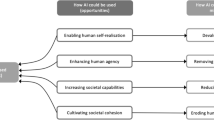Abstract
Laws, codes, and rules are essential for any community, public or private, to operate in an orderly and productive fashion. Without laws and codes, anarchy and chaos abound and the purpose and role of the organization is lost. However, danger is significant, and damage serious and far-reaching when individuals or organizations become so focused on rules, laws, and specifications that basic principles are ignored. This paper discusses the purpose of laws, rules, and codes, to help understand basic principles. With such an understanding an increase in the level of ethical and moral behavior can be obtained without imposing detailed rules.
Similar content being viewed by others
References
Plato (2000) The Republic. Translated by Benjamin Jowett. Dover Publications, Inc., New York, pp. 97–102.
Aristotle (1998). Nicomachean Ethics. Translated by D.P. Chase. Dover Publications Inc., Mineola, NY.
Kant, I., (1993). Grounding for the Metaphysics of Morals. Third Edition, Translated by J.W. Ellington, Hackett Publishing Company, Indianapolis Indiana, p. 14.
Mill, J.S. (1979) Utilitarianism, edited by George Sher, Hackett Publishing Company. Indianapolis, p. 7.
Herberg, W. (1986) What is the Moral Crisis of Our Time?, The Intercollegiate Review, p. 7.
Roy, R. (1990) A Primer on the Taguchi Method, Van Nostrand Reinhold, New York, pp. 11.
Deming, E. W., (1982) Out of the Crisis, MIT Press, Cambridge Mass., p. 49.
Kohlberg, L. (1976) Moral Stages and Moralization: The Cognitive-Development Approach, in Lickona, T., ed. Man, Morality, and Society, Holt, Rinehart and Winston, New York.
Gilligan, C. (1993) In a Different Voice, in Martin, W & Schinzinger R., eds., Ethics in Engineering, McGraw-Hill, New York.
McCuen, R.H. (1979) The Ethical Dimension of Professionalism, Issues in Engineering, ASCE, 105(2), pp. 89–105.
Spitzer, Robert J. (2000) The Spirit of Leadership, Executive Excellence Publishing, Provo, UT.
Isocrates, 436-338 B.C. (1955) Ideas on Liberty, Sept., p. 66.
Smith, J. quoted in Millennial Star, # 13:339, December, 1851. Salt Lake City, Utah.
John Adams to Benjamin Rush, 27 Sept., 1808, “The Spur of Fame”, pp. 119–120.
Author information
Authors and Affiliations
Corresponding author
Rights and permissions
About this article
Cite this article
Hawks, V.D., Benzley, S.E. & Terry, R.E. Establishing ethics in an organization by using principles. SCI ENG ETHICS 10, 259–267 (2004). https://doi.org/10.1007/s11948-004-0021-9
Issue Date:
DOI: https://doi.org/10.1007/s11948-004-0021-9




